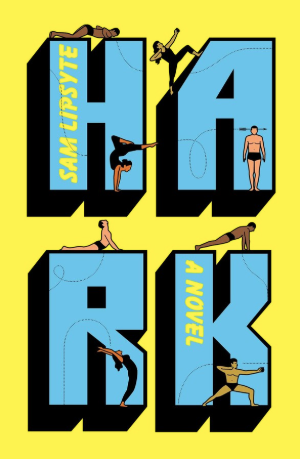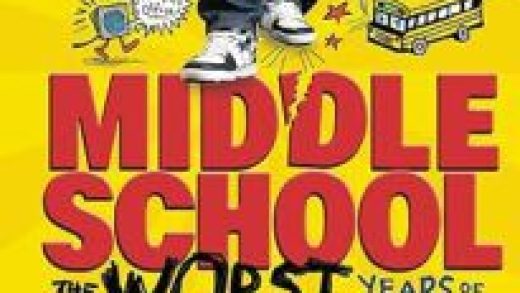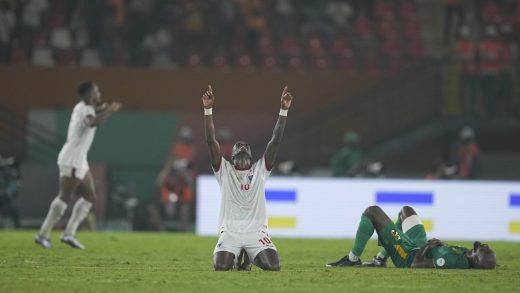The author of “Hark” on living in an era of self-marketing and the monetization of enlightenment
The world is embroiled in a devastating war. Income inequality — all inequality, in fact — seems insurmountable. The planet is dying. Tech addiction is making humans frazzled and disconnected. So who can blame us for looking for a savior, someone to believe in, who can make life better, or at least bearable?

That’s the world of Sam Lipsyte’s Hark, a slightly dystopian New York that nearly mirrors our own. In it, a would-be comedian named Hark Morner becomes instead a self-help guru. He preaches “mental archery,” a nonsense combination of yoga, junk history, and motivational speaking that purports to simply help people focus. The book follows his closest disciples, who place their problems on him and pull out answers, whether or not he actually offers them. No one knows exactly what they want, but it’s…something. Something to make living a little easier.
In true Lipsyte fashion, Hark is darkly funny — the characters are clueless and the dialogue is over-the-top. It satirizes wellness culture, the likes of Goop and Oprah-fueled actualization hucksters, all of which is ripe for satire. But there’s a deeper, universal truth here: the desire for guidance and comfort, for someone to say “here’s what to do” and “you’re doing it right.” Hark is about people’s quest for happiness, and that’s something Lipsyte told me he’d never make fun of.
We talked by phone and email about the monetization of enlightenment, the world falling apart, and whether there’s a savior for our era.

KH: As a well-known writer, and particularly as a teacher, you’re sort of a guru for young writers. How does that feel? What kind of guru would you like to be?
SL: I’m no guru. I’m a teacher, a mentor, a coach to my students. And when they begin to make their way into writing, I am thrilled to become a colleague and friend, a supporter, and student of their work. The idea of a guru connotes to me a static dynamic. It’s destructive and boring. Also, I don’t really have the energy. Gurus have to work hard.
The idea of a guru connotes to me a static dynamic. It’s destructive and boring. Also, I don’t really have the energy. Gurus have to work hard.
KH: The question of commerce, of capitalizing on Hark’s message, is a big theme throughout the book. Do you think gurus or spiritual leaders have to be marketers?
SL: That’s definitely a big thread running through the book. I don’t think anybody has to be a marketer, but our system puts enormous pressure on us to sell ourselves, to brand ourselves, whether we are hawking a spiritual system, or a medical technique, or just trying to land a job. It’s just a way for the forces of commerce to turn the idea of the individual against each of us, to put all the stress on us. All of this hustle is ultimately us pitching ourselves as people worth keeping alive. That’s the pitch. Let me live a little while longer, eat decent food, have shelter. In the book there is tension among those trying to monetize mental archery and those who see it as existing in a separate, more sanctified realm, as well as those who view it as a place from which to resist the aforementioned forces.
A Gift Guide for the Writer with Affluenza Who Has Everything But a Book Deal
KH: Particularly at the beginning of the book, Hark is a bit of an enigma, which is fitting for a sort of savior. Even if what he says is nonsense, he seems committed to it. He doesn’t seem exactly like a con artist, even if the product is bullshit. How much do you think Hark knows or believes what he’s doing?
SL: Part of the narrative movement of the book, I think, is Hark coming to terms with what this might all be about, and exactly who he might be. It’s not clear to him at first, but eventually it comes into, well, focus. He is certainly designed as a character we don’t know that much about, and he’s somebody the other characters project their fears and desires onto. He’s not really a con artist because he believes in what he’s saying, especially because at first it’s a simple and fairly innocuous message. Later this changes.
Our system puts enormous pressure on us to sell ourselves, to brand ourselves, whether we are hawking a spiritual system, or a medical technique, or just trying to land a job.
KH: Even though it’s a comedy, all of the events of the book take place against the world falling apart, which is sort of a familiar refrain these days. But you started writing this book in 2012, when the world was a very different place. Do you think there’s always a feeling of being in the worst era yet, no matter what era that is?
SL: I don’t see the comic elements of the book being in conflict with the dire state of the world it depicts. Humans have always used humor as part of their psychological survival kit. The book is definitely tilted to the funny, but I’m also interested in the vulnerability of these characters, and the tragic predicaments they face. It all comes out of the same swirl for me.
In 2012 people were talking about a lot of the problems we talk about now, the ever-rising inequality, the stagnant wages, climate change, the ascendancy of technology as a mode of surveillance and control. Maybe it wasn’t at the same volume, but it was there. We were only four years from the crash. Wars were dragging on. We were lucky to have better leadership than we do now, but the boat had already begun to sail. But you have a point. It’s so hard to know whether you are on the brink or it just feels like it. But in the past maybe people did think: “Well, spring will come, the flowers will bloom,” etc. But I’m sure watching a Roman legion coming over the hill, or seeing your village wiped out by plague, was no picnic. But I’m not a historian. I have a hard enough time imagining myself in my own time.
KH: I waffled between feeling like this book is entirely contemporary, that the world is the same as ours now, and that it’s dystopian, an apocalyptic moment with a new savior. Did you intend it either way?
SL: I’m glad you said “waffled,” as waffles figure somewhat prominently in the book! I did intend that feeling you describe, that “now but not now” sensation. It creates space to invent, but also anchors the story.
Humans have always used humor as part of their psychological survival kit.
KH: There’s a line in the book, “Every age gets the savior it deserves.” Do we have one now, and if so, who do you think it is?
SL: I’m still waiting. Any day now.
KH: The response to wellness trends, religion, fad diets, get-happy-quick schemes, etc. seems to be “it’s fine as long as it makes them happy.” Do you think that’s true? Or could there perhaps be something darker at work?
SL: It’s not the darkness so much. I mean, whenever people gather together there is the danger that certain more aggressive personalities will try to exploit the situation to their benefit, rather than work toward some kind of collective well-being. That’s the eternal darkness that comes with our species, I guess. But what I tend to think about is how these practices, whatever they end up being, which are in some sense totally understandable last-ditch efforts to not go completely crazy in a system bent on crushing the many for the luxury of the few, distract us from facing the truth of what we do to ourselves and the planet. And I’m as guilty as anybody in terms of distracting myself. But I guess that’s how I see it. Sort of an opiate of the masses argument. Of course, the deeper spiritual practices can and often are channeled to real change on the ground.
KH: Characters in the book talk about rich people and hot people being better than other normal people, but nothing about mindful or enlightened or focused people being better, even if that’s what everyone is searching for. Why is that?
SL: Mostly I think they’ve internalized some of the shame our society throws up around not achieving material success. I’ve run across a few people who might be a tad smug about their supposed enlightenment, it’s true. But such attitudes have no place in mental archery!
KH: I’d love to talk to you about wellness and gurus. Have you ever had a guru?
SL: I wouldn’t say I’ve had a guru, but I’ve had some wonderful guides over the years. Going back to some very wise summer camp counselors, and including English teachers, college professors and writing instructors. I’ve always looked to absorb as much from them as possible. I studied with Gordon Lish in New York in the mid-90s. He was generous with his time and knowledge and rigorous with his criticism. It was a great gift and I am indebted to him. He taught me and others how to write, but also how as an artist you have to move on from your teachers. Not past them, just in your own direction.

About the Author
Sam Lipsyte is the author of the story collections Venus Drive (named one of the top twenty-five books of its year by the Voice Literary Supplement) and The Fun Parts and four novels: Hark, The Ask, The Subject Steve and Home Land, which was a New York Times Notable Book and received the first annual Believer Book Award. He is also the recipient of a Guggenheim fellowship. He lives in New York City and teaches at Columbia University.
About the Interviewer
Katy Hershberger holds an MFA in Nonfiction Writing from The New School. Her work has appeared in Electric Literature, Catapult, TinHouse.com, The Rumpus, and elsewhere.


Sam Lipsyte Doesn’t Have the Energy to Be A Guru was originally published in Electric Literature on Medium, where people are continuing the conversation by highlighting and responding to this story.










